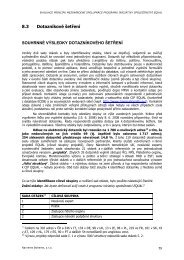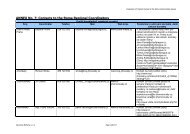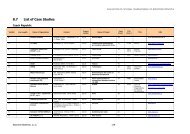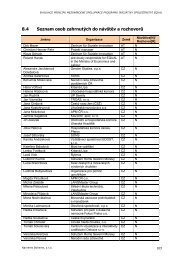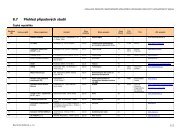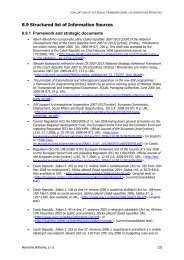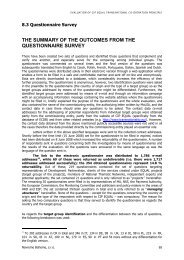EQUAL - Final report - eng - navreme
EQUAL - Final report - eng - navreme
EQUAL - Final report - eng - navreme
You also want an ePaper? Increase the reach of your titles
YUMPU automatically turns print PDFs into web optimized ePapers that Google loves.
EVALUATION OF CIP <strong>EQUAL</strong> TRANSNATIONAL CO-OPERATION PRINCIPLE<br />
work of the expert teams and professional seminars focused on development of particular new tools<br />
or educational materials than for joint experiments, innovative forms of work, some types of<br />
dissemination and implementation. Different background is necessary to be created for various<br />
participating groups, to presume different forms of work; each of these types requires different<br />
logistics and outputs.<br />
One of the variants of structuring being offered that is worth mentioning is “variable” structuring. It<br />
may relate to the cooperation itself and perhaps still more to the approach of the national support and<br />
managing structure. It is obvious from the statements in the interviews the respondents would, on the<br />
one hand, welcome the possibility to influence the cooperation more, to have it more in their hands<br />
and, on the other hand, they would appreciate more freedom, creativity, flexibility. Certain dichotomy<br />
in this respect is understandable and it would be possible to accommodate it by higher extent of<br />
structuring in the initial stages of the project (see the parts dealing with the project preparatory<br />
stages above), which would in case the cooperation proves useful, pass into greater freedom and<br />
would develop the motif of mutual trust and responsibility of the partners more. This model could be<br />
very convenient for involvement of the national support structures, even if it were not easy to set<br />
understandable and comparable conditions for it at the beginning.<br />
It is then convenient to choose the tools, forms and particular activities of the transnational<br />
cooperation according to the content and objectives of the particular partnership and according to the<br />
involved target groups generally already in the preparatory stages of the project, as the case may be<br />
of the development partnership. The bearer of this know-how in this future comparable projects can<br />
be hardly anybody else than the national support and managing structure.<br />
5.4 Sustainability, mainstreaming and wider partnership<br />
networks<br />
The issues of sustainability, mainstreaming and wider partnership networks relate above all to:<br />
• further utilisation, ownership and copyright and its succession at the products arisen within<br />
the framework of the project – know-how, information and educational materials, CDs and<br />
DVDs, tutorial materials, work sheets, promotional materials, brochures, web sites, outputs of<br />
research, auxiliary ledgers, the best procedures and practices and the like are concerned,<br />
namely including the possibilities for their further development, which as the case may be<br />
need not be of non-commercial character any more;<br />
• dissemination of the outputs and products arisen / tested within the framework of the projects<br />
and their implementation in wider context (thematic / resort area, geographical area –<br />
regional or nation-wide public policy, legislation); complementing the outputs, grouping and<br />
accessibility of the outputs according to the topics, i.e. not only according to the isolated<br />
projects; interconnection of the outputs at the corresponding level with the target groups<br />
concerned;<br />
• active work with wider groups of recipients and potential recipients of the outputs from<br />
the projects, it means with the groups, which are not and could not have been identified in<br />
the project as the “target groups”, but in spite of that they enter the game in some way or<br />
other; if this happens, then it is essential for wider links and usability of the project outputs to<br />
address them and <strong>eng</strong>age them actively;<br />
• maintaining of the established partnerships and relations, further utilisation of the acquired<br />
contacts, scope of knowledge and self-confidence and their further transfer at the level of<br />
links, relations and personal (personality) growth.<br />
With regard to the aspect of the transnational partnership and cooperation in the projects being<br />
evaluated, it is necessary to construe these topics as complementary, but not as marginal. In the<br />
basic plan, it is necessary for them to be considered and solved already within the framework of the<br />
projects. The solving entities bear indisputably the principal responsibility for sustainability of the<br />
project’s outputs and also for maintaining of the created relations and links, in spite of the fact that<br />
the role of the national support and managing structure (and as the case may be of other bodies) is<br />
Navreme Boheme, s.r.o. 37



